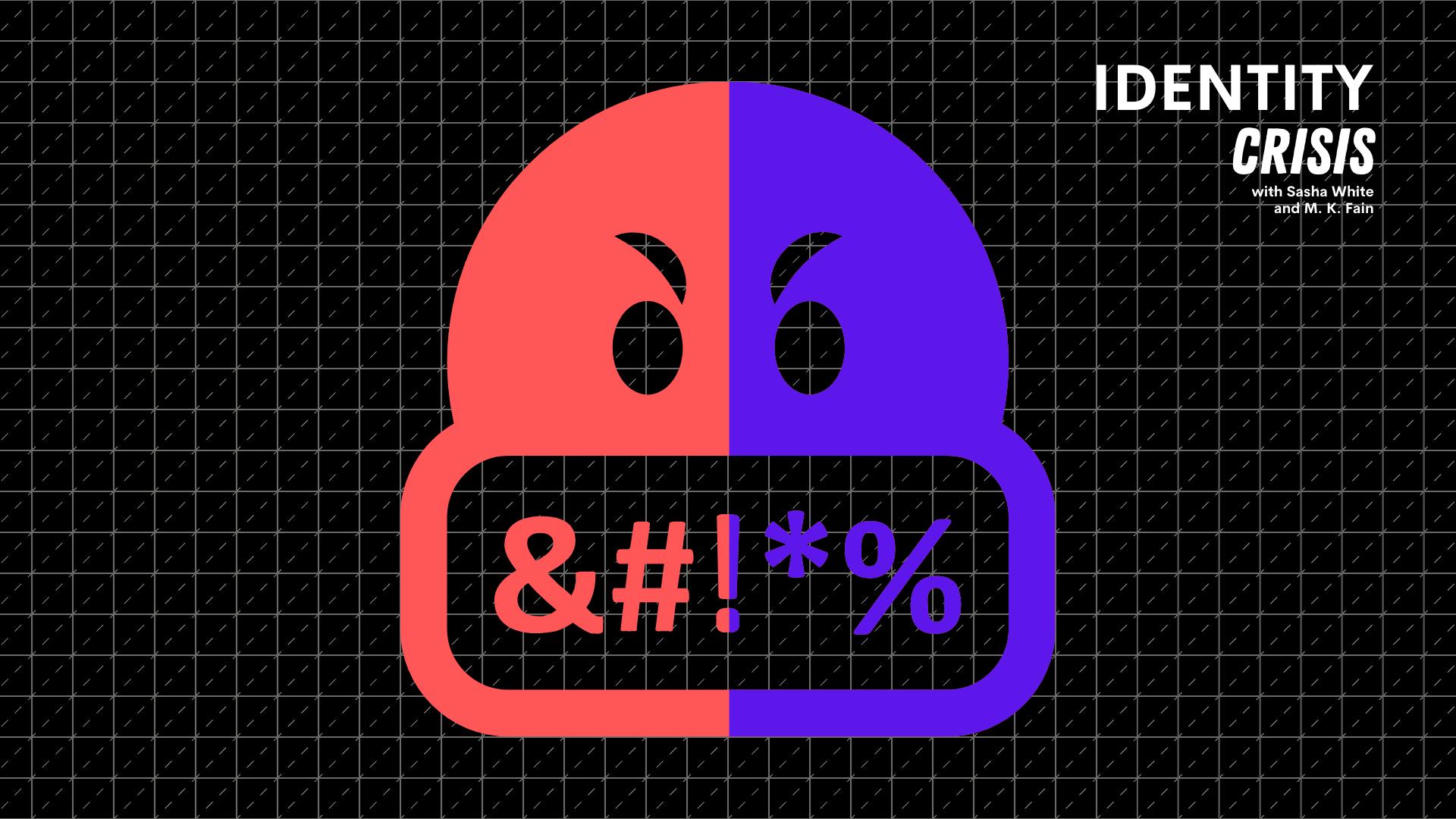Identity Crisis: How Do you Deal With Negative Feelings in the Movement?
Turning despair, rage, and jealousy into something productive

"Identity Crisis" is a new weekly column and podcast for young people struggling with the modern orthodoxy of gender identity ideology—developed in collaboration between Plebity and 4W by M. K. Fain and Sasha White. Each week, we will answer one or two of your questions, both as a running column here on 4W, and in the form of a video on YouTube.
To submit a question, email us at: [email protected]. We may publish your question in full, so be sure to leave out or change any identifying details if you would like to remain anonymous. Or, specify that your question is private and you would rather we discuss it in a general way.
Over the past week, Sasha and I have heard from women of all ages expressing a feeling of despair about the state of the movement. Some women feel scared and helpless after Biden’s executive orders have demolished women’s rights in the United States. Others are frustrated at friends and family who won’t take the threat of gender identity seriously, leading to feelings of isolation. And still other women are frustrated at the movement itself, other feminists, or organizations we disagree with.
The feelings of anger, frustration, sadness, isolation, and fear can be all-consuming. When you care about an issue as much as we care about protecting women and girls, it’s hard not to be overwhelmed by the enormity of the task ahead of us. When you see the real harms that systems of male violence and patriarchy have on women and girls, every little disagreement in the movement can turn into a life-and-death debate. Negativity spreads, and unhappy people tend to take their issues out on others, lashing out at women who should be their allies out of a feeling of helplessness or jealousy.
Together, these negative feelings drag down the women’s movement by creating cycles of rumination and despair and toxic cultures where any disagreement is seen as a threat. While you can’t control anyone else’s actions or reactions, learning to manage your own internal strife while working in the movement can ultimately end up making us more productive.
Women often bring their own trauma into the movement. For many of us, discovering feminism is the first experience we have at naming, processing, and understanding the context of the male violence, discrimination, or objectification we have experienced. We treat feminism as group therapy rather than a political movement, and end up replicating the same toxic patterns that have shaped the rest of our lives as we fail to work on ourselves before diving in with others. This is most clear in the cycle of in-fighting, trashing, and idealization/demonization women in the Movement put each other through.
I’m not a therapist, and this advice shouldn’t be taken as a substitute for therapy. However, if you are struggling with negative feelings related to the state of the Women’s Movement, these are the skills that have helped me channel negativity into productivity.
Learn to name your emotion and identify its source
Witches have long known the power of naming. To name something is to understand it. To understand something is the first step in controlling it. It’s the same reason technologists often joke that “the hardest thing in programming is naming things.”
If you are feeling negative about the state of women’s rights, the Movement, or even another feminist, the first step to handling this emotion is to name it.
Are you angry? Sad? Frustrated? Jealous? Lonely?
Once you have named the specific negative feeling, you can begin to identify the cause of it.
Are you angry because you feel silenced and ignored? Are you sad because your daughter is suffering? Are you frustrated because you feel helpless to enact change? Are you jealous because another woman is getting attention for something you did first? Are you lonely because your friends just don’t get it and you miss when you could talk to them more honestly?
If you’ve never practiced naming and identifying the source of an emotion before, this can be a lot easier said than done. I’ve noticed men, in particular, really struggle to actually pin-down what specifically they are feeling and why. The more you have learned in your life to ignore and suppress your emotions, or act tough to survive, the harder this may be. Sometimes, it may require digging deeper into yourself than you’re really ready to go.
I can not stress enough how much seeking real professional therapy can help with this stage. However, I recognize that this is often inaccessible to many people for a variety of reasons.
Once you’ve identified what is causing the negative emotion—you can start to take action on it! Sometimes that action might be doing productive work to combat the problem at hand. Sometimes, if it’s something you can’t control, the action may be choosing to let go. Both of these are productive by allowing you to move on.
Remember the humanity of others
There is a cognitive bias humans exhibit called the “fundamental attribution error.” This is the tendency we have to justify our own faults or failures with situational explanations while simultaneously assuming the faults or failures of others are explained by something innate about who they are.
For example, if you are late for work one day you may explain this to yourself by thinking, “I was late because I was up all night with a crying baby and didn’t sleep well.” However, if your colleague is late to work, you may assume this is because she is lazy, unorganized, or unprofessional.
So how does this relate to our own negative feelings in the Movement?
I’ve noticed that many feelings of negativity derive from making assumptions about others’ intentions, and drawing conclusions based on those assumptions. When we remember that both our sisters in the Movement as well as our patriarchal adversaries are just people trying to get by in a tough world and mostly just doing the best they can, some of the feelings of rage and frustration can be replaced with more productive empathy. Even if we still disagree with what that person is doing or saying, assuming that they are not acting out of malice but rather attempting to do what they think is right allows us to meet them on their level and engage in productive discussion rather than debate with the goal of tearing each other down.
Know and stick to your boundaries
Recognizing the humanity of others doesn’t mean we let them walk all over us, though. You can simultaneously empathize with why someone is acting in a harmful way, and also know that you don’t want to be anywhere near it.
If you know that certain topics, issues, debates, or even people result in a negative reaction from you that you have been unable to channel into a productive outlet—it’s okay to set a boundary for yourself.
Use the tools available to help you avoid ruminating or spiraling on certain topics that you know are toxic for you. For example, when I say something I know will be controversial among my fellow feminists on social media, I immediately mute the thread so I don’t see any further replies to it. This allows me to say my piece, but block out any of the attacks and drama I tend to obsess over. It makes my time on social media much more productive since I don’t get sucked into endless debate threads.
Find the part of the Movement that brings you joy
Marie Kondo isn’t just for your closet and junk drawers. Examine the ways that you connect with the Movement and find which ones bring you joy, and which ones only bring negativity. Focus on doing what you actually like doing.
For example, if you always end up feeling negative after spending time on a certain social media site—spend less time there! Meanwhile, if you find you feel connected, inspired, or motivated by attending feminist webinars or live chats online—do more of that! If you really like doing something, maybe you can do more of it by helping to organize. Do you have the time or skills to contribute to creating a new webinar series?
Some women genuinely enjoy the fight on social media. If that’s you, great! If that’s not you, let the others do it.
Some women genuinely enjoy writing blogs or articles. If that’s you, great! If that’s not you, let the others do it.
Some women genuinely enjoy organizing events and dealing with logistics. If that’s you, great! If that’s not you, let the others do it.
While the work of a political movement like ours shouldn’t always be expected to be “fun,” per say, reducing unnecessary negativity in your life by stepping back from parts of the movement that cause you nothing but grief is not only emotionally healthy, but actually likely to make you more productive in other areas.
Remember the humanity of yourself
Remembering our own humanity means recognizing that we, too, are fallible, struggling individuals who are just trying to get by.
Sometimes, for women, empathizing with others is easier than being kind to yourself. If you feel despair, frustration, anger, jealousy, or loneliness—it’s okay. If you’re not always productive or contributing how you wish, that’s okay, too. If you’re in an emotionally unstable position, trying to force yourself to be productive in the movement can do more harm than good by negatively impacting those around you. You may need to do things to get yourself healthy, safe, or stable before you are able to really contribute productively to the Movement.
Prioritizing self-care isn’t selfish. It means you are investing in building up a stronger feminist warrior for the next battle—and there’s always a next battle.
You can listen to "Identity Crisis" on Spotify, Google Podcasts, or wherever you get your podcasts. Subscribe to updates on Identity Crisis here: identitycrisis.xyz/get-updates
Enter your email below to sign in or become a 4W member and join the conversation.
(Already did this? Try refreshing the page!)





Comments